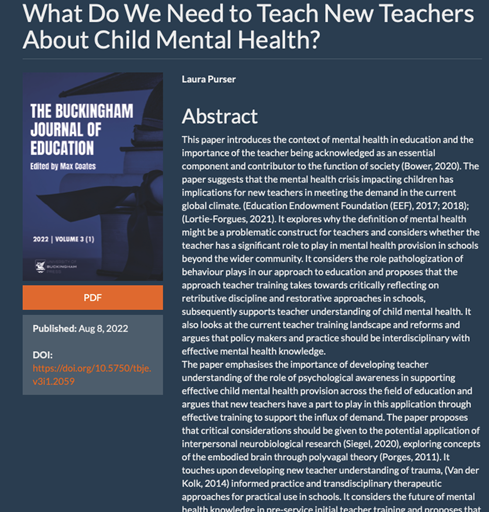An article exploring the research literature around mental health and teacher training, titled ‘What do we need to teach new teachers about child mental health?’ by Laura Purser (Lecturer in Education, University of Reading) has recently been published in The Buckingham Journal of Education, and is available free of charge here.

This article reviews the literature surrounding mental health discourse in education and suggests that the mental health crisis impacting children, has implications for new teachers in meeting the demand in the current global climate (Education Endowment Foundation, 2017, 2018; Lortie-Forgues, 2021). It also explores why the definition of mental health might be a problematic construct for teachers and considers whether the teacher has a significant role to play in mental health provision in schools beyond the wider community. Moreover, the article also looks at the current teacher training landscape and reforms and argues that policy makers and practice should be interdisciplinary with effective mental health knowledge. The article emphasises the importance of developing teacher understanding of the role of psychological awareness in supporting effective child mental health provision, and proposes that critical considerations should be given to the potential application of interpersonal neurobiological research (Siegel, 2020) and concepts of the embodied brain through polyvagal theory (Porges, 2011). Overall, the article aims to support the role of initial teacher training education (ITT/ITE) in developing teacher competencies, creating confident new teachers with efficacy to meet the needs of child mental health in school.
The research focus beyond the scope of this article feeds into Laura’s EdD project, carried out at The University of Buckingham. Laura is a third-year student, aiming to complete in 2024. Her research will look at designing and implementing a new cohesive, integrative training programme incorporating key messages from the salient literature, indicating key knowledge that new teachers may need to obtain and critically reflect upon. This training aims to become effectively sequenced and embedded in the ITE curriculum to support teachers to inform their practice supporting child mental health and co-currently their own. The research seeks to evaluate the effectiveness of the training, informed by interpersonal neurobiology, polyvagal theory and trauma informed educational pedagogies and gather data on trainee teacher level of competency and efficacy in applying theory into their classroom practice.
Laura recently joined the Institute of Education, and her main role is the Academic Programme Director on the BA Primary Education (QTS). She is also a Chartered Psychologist (BPS).
Laura tweets at @laurapurser1.

References
Education Endowment Foundation. (2017, March 10). The EEF Toolkit: Bridging gap between educational research and classroom practice. https:// educationendowmentfoundation.org.uk/news/the-teaching-and-learning-toolkit -a-complex-summary/
Education Endowment Foundation. (2018). Sutton Trust-EEF Teaching and Learning Toolkit & EEF Early Years Toolkit. https:// educationendowmentfoundation.org.uk/public/files/Toolkit/Toolkit_Manual _2018.pdf
Lortie-Forgues, H., Sio, U.N., & Inglis, M. (2021). How should educational effects be communicated to teachers? Educational Researcher, 50(6), 345-354.
Siegel, D.J. (2020). The developing mind: How relationships and the brain interact to shape who we are. Guilford Publications.
Porges, S.W., (2011). The polyvagal theory: neurophysiological foundations of emotions, attachment, communication, and self-regulation (Norton Series on Interpersonal Neurobiology). WW Norton & Company.
Purser, L. (2022). What do we need to teach new teachers about child mental health? The Buckingham Journal of Education, 3(1). https://doi.org/10.5750/tbje.v3i1.2059

